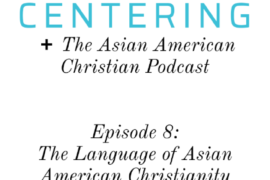
I recently started a spiritual practice of burning Palo Santo to center myself during morning prayer. This practice may not seem all that controversial for someone with my ethnic makeup. But being raised in a Filipino household by good Protestant parents, I was sharply warned about Roman Catholic practices: burning incense, lighting candles, and venerating the saints through iconic imagery.
This cultural suspicion is what Russell Yee describes as a collective fear from Asian North American churches towards syncretism (Russell Yee, Worship on the Way, 98). No doubt for Filipino Protestants, the fear of syncretism is warranted. Many 1st generation Filipino Americans like my parents experienced how the cultural blending of animism and polytheism with religious Catholic ritual yielded distortions of Christian faith (Leny M. Strobel, Coming Full Circle, 137). So what reasons did I have for breaking with tradition?
…what reasons did I have for breaking with tradition?
Using sensory aids in prayer emerged out of a dry season when my spiritual rhythms grew scarce, which is problematic for someone in my line of work. As a pastor, my vocation is synonymous with prayer. So it was humbling to discover that the barriers keeping me from prayer stemmed from one root cause: I did not enjoy praying. Prayer was not life-giving; it was a chore.
This sobering realization caused a significant shift in my thinking, as my questions changed from Why don’t I pray? to How can prayer elicit delight in God? How can spiritual practice become more beautiful in my life? As I pressed into these questions, I started to pay less attention to the infrequency of my prayers and more attention to how I prayed.
I discovered that my upbringing taught me to disengage my body in prayer. Growing up, I was told to distrust my body—specifically, my senses— whenever I prayed. I suspect that this is true for many Asian Americans. Part of what we have inherited from western faith traditions is a disembodied Platonic spirituality that engages our minds but disconnects us from our bodies. For many of us, prayer remains an intellectual exercise, not an embodied one.
I was told to distrust my body… whenever I prayed.
And yet, the scriptures do not devalue the role one’s body plays in spiritual practice. Rather, they offer us a different picture. The Psalmist exclaims, “O taste and see that the Lord is good!” (Psalm 34:8). I don’t think it is incidental that Christ teaches us to remember him through bread and wine. Christian worship gatherings traditionally end with a meal for a reason. In this event, we see just how much God cares for the body. At the Table, we are confronted with God’s desire to nourish our bodies, by engaging our most intimate senses: taste and touch. And it is precisely through these bodily senses that we experience delight in God!
What I am proposing about embodied spiritual practice is neither novel nor instantaneous. There is no silver bullet to cultivating a strong prayer life. To be sure, spiritual practice takes discipline. But I often wonder if, as Asian Americans, the discipline of scripture reading and prayer has been so formed by Confucian duty (Yee, 97-98) that we forget the greatest commandment driving our obedience: the love of God.
Curating beautiful spiritual practices might look different for everyone: hiking the mountains, listening to live music, or meditating on a painting. But I believe this much is true: a Christian spirituality that fails to enlist our senses is a bastardized one. For me, poetic spirituality looks like the sacred fragrance that accompanies my prayers in the quiet of the early morning. Just before I open the scriptures, I light candles and Palo Santo wood. And as I watch the smoke rise and dance, filling the air and morning light, the smell of myrrh invites me to pause and savor God’s presence. These days, I find myself looking forward to the sacredness of that moment.



43 Comments
Pingback: sleeping music
Pingback: relaxing jazz
Pingback: jazz relaxing music
Pingback: relaxing music
Pingback: Klein Dappertje
Pingback: best escape from tarkov cheats
Pingback: cartel vape pen
Pingback: Hua Hin Thai restaurant
Pingback: dark168
Pingback: Applied Research
Pingback: สล็อตฝากถอน true wallet
Pingback: pk789
Pingback: marbo 9000
Pingback: Pharmaceutics
Pingback: free tokens
Pingback: พลาสติกวิศวกรรม
Pingback: pgslot
Pingback: เช่าห้องเก็บของ
Pingback: ทางเข้าpg168
Pingback: the best thai massage in denver
Pingback: สล็อตเว็บตรง โบนัสแตกบ่อย ถอนเงินได้ชัวร์ไม่โกง
Pingback: ทดลองเล่นสล็อตทุกค่าย ฟรี
Pingback: เค้กด่วน
Pingback: lazywin888
Pingback: ไฮเบย์
Pingback: bangkok tattoo
Pingback: สล็อตเกาหลี
Pingback: hr42
Pingback: ประวัติความเป็นมาของเว็บสล็อตออนไลน์ Pok9
Pingback: เว็บปั้มไลค์
Pingback: y2k168
Pingback: Mostbet
Pingback: Nancy
Pingback: Dragon Hatch 2
Pingback: test.afmlta.asn.au
Pingback: แทงบอลกินค่าน้ำ คืออะไร?
Pingback: สิ่งที่ควรคำนึงเมื่อเลือก เว็บหวยออนไลน์ จ่ายจริง
Pingback: เครื่องทําสเลอปี้
Pingback: Buccaneer Deluxe
Pingback: หารค่าเหล้า
Pingback: league88
Pingback: ฝากครรภ์ที่ไหนดี
Pingback: PinUp yukle